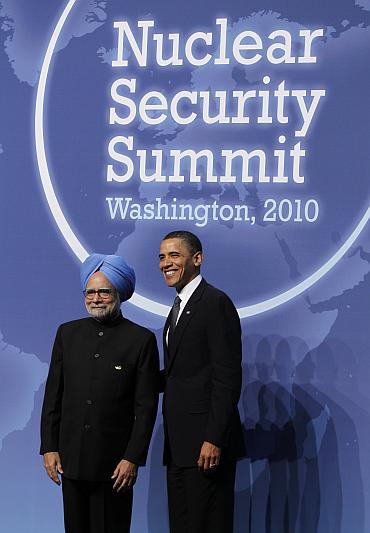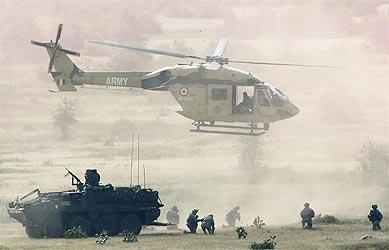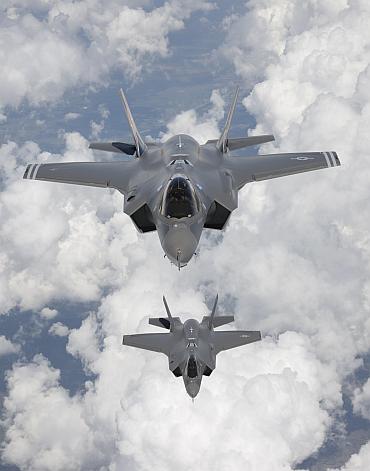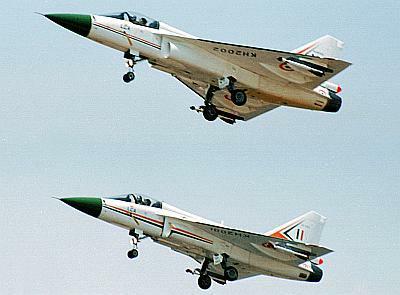 | « Back to article | Print this article |
'Are we going to fight Pakistan with the US'
The Indian experience of buying weapons from America is not smooth. We have recently found problems in weapons-locating radars of the United States. The American transfer of technology means that they will build, they will sell the item and keep you on a short leash as far as spare parts and support system are concerned.
My contention is that as long as we don't have a deep political understanding with the US, it is not advisable to get into a deep defence relationship. The Asia Pacific is America's concern, but India's concern is Pakistan, Afghanistan and China. Why do we need certain defence agreements with US that give us inter-operability in far away shores?
Further, growing Indo-US defense ties suggest that the Indian government has given up on the goal of self-reliance. It is now merely a political slogan. Their excuse is lame.
They say the Defense Research and Development Organisation has not delivered. I don't think critics of the DRDO have analysed what is not delivered. There is no synergy in the ministry of defence. There is no synergy between the decision-making structures of the government. Army headquarter is one silo, the naval and air force headquarters are separate silos. The ministry of defence works on its own. There is a very loose coordination attempted at the individual level without a formal structure. There is a firewall between the production and the research side of the weapons making systems. There is hardly any mission statement from the armed forces. That doesn't come because you don't have a national security strategy and its stated goals.
'Army's shopping from the US doesn't make sense'
The Indian armed forces are apolitical; why there should not be a chief of defence staff? How will he become more powerful than politicians?
Today in cyber warfare, we don't have joint strategies of the three wings. I have seen meetings between the chiefs of the three defence wings. They don't produce any doctrines. They function on a limited agenda.
When the issue of buying of defense equipment from America comes, they talk about 'latest' and 'high technology.' These are just subjective words. What India needs is to fight efficiently with its competitors. We are not in competition with the US or Europe. We are and we should compare ourselves with our neighbours.
I have not read a professional joint mission need of Indian forces in 40 years. So, who is pushing the forces to buy such costly arms?
'Why should we go for American aircraft'
In absence of solid internal defence coordination of the three wings of the air force, army and navy, how can India sign the Communication Interoperability & Security Memorandum of Agreement, Logistics Support agreement, End Users Agreement kind of pacts with America? Some of these agreements will allow the inter-operability of Indian forces with the US, but what about inter-operability within our own forces?
If we sign such agreements with the US then we will need double set of equipments: One to read American algorithms and one to read ours. Why do we need inter-operability that the Americans want so much? Are we going to fight with Pakistan or any other country along with the US? Surely, we don't want to join American forces doing the dirty work of intervention operations? The Indian armed forces should remain independent of such tie-ups, which are not backed by political understanding of the highest order.
In my assessment all that the Indian defence forces need is updated Sukhoi- 30s and Light Combat Aircraft. We should keep modernising the LCAs; they are as good as the Mirage 2000.
Why should we go for American- made 126 Medium Multi-Role Combat Aircraft? Each US-made MMRCA will cost us over $ 70 million while the LCA cost us only $ 26 million. Why should we spend so much money? Of course, we have problems with our LCA but we should be working to solve that. Why should we be so keen to become dependent? And, remember, when you build the LCA indigenously, you are building an institution.I can say only that I disagree with my own community when they want to go for US- or Israel-made weapons and completely bind themselves with them. I know for sure that in 2003 the Air Force only wanted the Mirage 2000. Why don't you upgrade it? I think that is what the Indian Air Force needs to fight China, Pakistan or any other neighbour if need be. The Indian government doesn't have second professional advice. It is totally in the hands of service chiefs who many times don't agree with each other. That disturbs the country's research and development and upsets production infrastructure.
'India and US' political goals do not match'
At this rate, in the long term, our dependence on the US will increase. Indian taxpayers will pay much more than what you should be paying for the capabilities being created. I think we will feel sorry when we have to use those capabilities.
Importantly, if the US and India's political goals do not match, then US made equipment capabilities will be much reduced, with problems of spare parts, upgradation and other legal restrictions on technologies.
There are many lobbies working around in New Delhi representing the British, French, Americans, Russians, etc. I believe they should not influence us. Even foreign aircraft come only after 10 or so years don't blame indigenous efforts to develop them that take that kind of time.
Second, we must see what we can afford.
'We must promote self-reliance'
Being poor is no crime. But being a slave is a crime. How can you file status report to Americans under the LSA?
On one side we are losing politically when in Af-Pak policy the Americans keep India out while allowing Pakistan to have strategic depth, but still we want to sign defence agreements with them.
I agree that the US is a powerful country. We should have defence ties with it. But we must promote self-reliance. China is doing today what it wants because it's not dependent on others. You can't be even a sub-regional power if you are totally dependent on outside powers for your weapons. We can't even have military diplomacy.
Also, China's official defense budget is three times our own and their procurement costs are much lower than ours because they have much greater levels of indigenisation. So, when we are buying from abroad our needs cannot clearly help to bridge the growing asymmetries in capability. We must be cautious of the factor of affordability when planning to buy from America or any other country. We have to choose appropriate strategies to meet our mission needs and not some hypothetical 'state-of-the-art' printed in the brochure of weapons manufacturing companies.
As told to Sheela Bhatt
Vice-Admiral Raman Puri is a former Chief of the Integrated Service Command who has spoken about the dangers of the Indian defense forces becoming dependent on foreign countries for weapons requirements. He retired in 2006 after 40 years of service.




